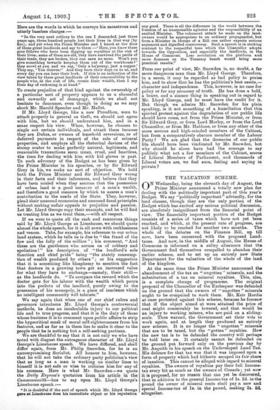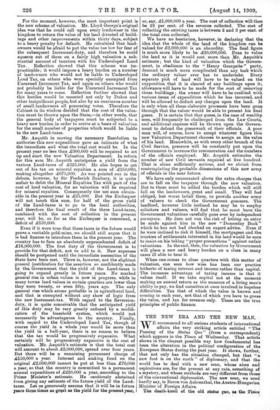THE VALUATION SCHEME.
ON Wednesday, being the eleventh day of August, the Prime Minister announced a totally new plan for dealing with the politically important part of this year's Budget. We say "politically important" advisedly, for the land clauses, though they are the only portion of the Budget which has excited any serious political discussion, are absolutely insignificant from the financial point of view. The financially important portion of the Budget consists of a series of taxes which have not yet been reached, and which, at the present rate of progress, are not likely to be reached for another two months. The whole of the debates on the Finance Bill, up till now, have been concerned with the proposed Land- taxes. And now, in the middle of August, the House of Commons is informed on a sultry afternoon that the Government find themselves compiled to abandon their earlier scheme, and to set up an entirely new State Department for the valuation of the whole of the land of the kingdom.
At the same time the Prime Minister announced the abandonment of the tax on " ungotten " minerals, and the substitution of a tax on mineral royalties. This, also, is a complete change of programme. The original proposal of the Chancellor of the Exchequer was defended on the ground that the owners of " uugotten " minerals ought to be compelled to work them. Mr. Heir Hardie at once protested against this scheme, because he foresaw that if the object aimed at were attained the price of coal might conceivably be lowered, and that would be an injury to working miners, who are paid on a sliding. scale. Thus warned, the Government set their wits to work again, and at length they produced an entirely new scheme. It is no longer the " ungotten " minerals that are to be taxed, but the " gotten " royalties. How the new tax is to be defended the country will perhaps be told later on. It certainly cannot be defended on the ground put forward only on the previous day by Mr. Asquith in his speech on the Undeveloped. Land Tax. His defence for that tax was that it was imposed upon a form of property which had hitherto escaped its fair share of taxation. This cannot be alleged with regard to mineral royalties. The owners of royalties pay their full Income- tax every bit as much as the owners of Consols • yet now it is proposed, for no reason that can yet be discovered, that in addition to the general income-tax of is. 2d. in the pound the owner of mineral rents shall pay a new and special Income-tax of is. in the pound, making 23. 2d. altogether. For the moment, however, the most important point is the new scheme of valuation. Mr. Lloyd George's original idea was that he could call upon every landowner in the kingdom to return the value of his laud divested of build- ings and other improvements within thirty days, subject to a heavy penalty for default. He calculated that land- owners would be afraid to put the value too low for fear of the subsequent Increment-duty, and therefore he could squeeze out of them on a fairly high valuation a sub- stantial amount of taxation with his Undeveloped Land Tax. Reflection showed that this scheme was im- practicable; it would impose a heavy burden on a number pf landowners who would not be liable to Undeveloped Land Tax, on others who were specially exempted from Unearned Increment Tax, and again on others who would not probably be liable for the Unearned Increment Tax for many years to come. Reflection further showed that this burden would be resented not only by Dukes and other insignificaut people, but also by an enormous number of small landowners all possessing votes. Therefore the Cabinet in its wisdom decided that the cost of the valua- tion must be thrown upon the State,—in other words, that the general body of taxpayers must be subjected to a heavy new burden in order to arrive at a basis of valuation for the small number of properties which would be liable to the new Land-taxes.
Mr. Asquith in moving the necessary Resolution to authorise this new expenditure gave an estimate of what the immediate and what the total cost would be. In the present year no less than £300,000 will be required to set up and start the new Valuation Department. In return for this sum Mr. Asquith anticipates a yield from the various Land-taxes of £325,000. He also hopes to get out of his tax on mineral royalties a sum of £350,000, making altogether £675,000. As was pointed out in the debate, however, by Sir Frederick Banbury, it is quite unfair to debit the Mineral Royalties Tax with part of the cost of land valuation, for no valuation will be required for mineral royalties. Consequently the net sum obtain- able in the present year is £25,000. But the Exchequer will not touch this sum, for half of the gross yield of the Land-taxes is to go to the local authorities, and therefore the final result of the three Land-taxes, combined with the cost of collection in the present year, will be, so far as the Exchequer is concerned, a deficit of £138,000.
Even if it were true that these taxes in the future would prove a veritable gold-mine, we should still argue that it is bad finance to introduce them in the present year. The country has to face an absolutely unprecedented deficit of £16,000,000. The first duty of the Government is to provide for that deficit, not to add to it. New expenses should be postponed until the immediate necessities of the State have been met. There is, however, not the slightest general justification for the assertion so confidently made by the, Government that the yield of the Land-taxes is going to expand greatly in future years. No marked general rise in urban values is now in progress, while in many towns land values in certain quarters are lower than they were twenty, or even fifty, years ago. The only general rise which seems probable is in agricultural land, and that is exempted without any show of logic from the new Increment-tax. With regard to the Reversion- duty, it is quite conceivable that the anticipated yield of this duty may be very greatly reduced. by a modifi- cation of the leasehold system, which would not necessarily be advantageous to the country. Finally, with regard to the Undeveloped Land Tax, though of course the yield in a whole year would be more than the yield in a half-year, there is no reason to believe that the tax would be progressively expansive. What certainly will be progressively expansive is the cost of valuation. Mr. Asquith's estimate is that the total cost will amount to about £2,000,000, spread over four years. But there will be a remaining permanent charge of £150,000 a year. Interest and sinking lipid on the original £2,000,000 cannot be put at less than £70,000 a year, so that the country is committed to a permanent annual expenditure of £220,000 a year, according to the Prime Minister's estimate. He cautiously abstained from giving any estimate of the future yield of the Land- taxes. Let us generously assume that it will be in future years the times as great as the yield for the present year, or, say, £1,000,000 a year. The cost of collection will then be 22 per cent. of the revenue collected. The cost of collecting the existing taxes is between 2 and 3 per cent. of the total sum collected.
We have no hesitation, however, in declaring that the idea that the whole of the land of the kingdom can be valued for £2,000,000 is an absurdity. The final figure is much more likely to be £20,000,000. Even to value the land as it is would cost more than Mr. Asquith'S estimate ; but the kind of valuation which the Govern- ment, in obedience to the "Henry Georgeite " party, demand is much more complicated than any task which the ordinary valuer ever has to undertake. Every separate plot of land will have to be valued on the supposition that it is cleared of any buildings upon it; allowance will have to be made for the cost of removing those buildings ; the owner will have to be credited with various items of expenditure which he has incurred, and will be allowed to deduct any charges upon the laud. It is only when all these elaborate processes have been gone through that the valuer would be able to present his final guess. It is certain that that guess, in the case of wealthy men, will frequently be challenged from the Law Courts, and additional expense will be thrown upon the Govern- ment to defend the guesswork of their officials. A poor man of course, have to accept whatever figure this new Valuation Department chooses to assign as the value of his land. Meanwhile, as with every other branch of the Civil Service, pressure will be constantly put upon the Government to increase the remuneration and the numbers of the officials employed. Mr. Asquith estimates the, number of new Civil servants required at five hundred. That is alone sufficiently serious, and we shrink from contemplating the probable dimensions of this new army of officials in the near future.
We have only enumerated above the extra charges that are to fall on the taxpayer through the new valuation. But to these must be added the burden which will still fall on the landowners, great and small. They will feel obliged, lest worse befall them, to provide another army, of valuers to check the Government guessers. The landlord, however little inclined he may be to employ solicitors and valuers, will feel that he must have the Government valuations carefully gone over by independent surveyors. He dare not run the risk of letting an entry be made against him in the new "Domesday Book" which he has not had checked on expert advice. Even if he were inclined to risk it himself, the mortgagees and the trustees of settlements interested in his land would be sure to insist on his taking "proper precautions" against unfair valuations. In the end, then, the valuation by Government will place a new and heavy burden on a class in many cases ill able to bear it.
When one comes to close quarters with this matter of valuation, one sees how wise has been our practice hitherto of taxing interest and income rather than capital. The immense advantage of taxing income is that it values itself. If we take capital not at the moment making an annual return as the measure of a living man's ability to pay, we find ourselves at once involved in hopeless difficulties. Tax that of which the value is known and coming in each year' not that of which you have to guess the value, and tax for revenue only. These are the true principles of public finance.







































 Previous page
Previous page